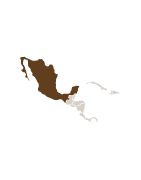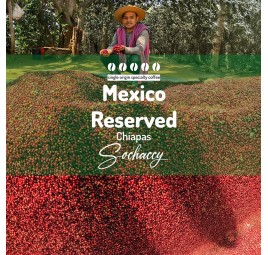Family passion for coffee from the heart of Poland since 2014
3 products


Mexico and Coffee - History and Economic Impact
Although coffee didn't arrive here until the late 18th century, it quickly became not only a popular beverage, but also a strong pillar of the country's economy and culture. Although this Central American country, is not as recognized for its coffee production as Colombia, it has a rich heritage of producing high-quality beans. The country is one of the world's major coffee producers, as well as the largest supplier to the United States. The history of coffee production in is complex and deeply rooted in the country's politics.
How Mexico Took the First Steps in Cultivation
Coffee likely arrived in the state of Veracruz in the second half of the 18th century from Cuba, thanks to Spaniard Juan Antonio Garcia. Initially, coffee struggled to gain popularity, as drinks such as chocolate and atole were already well entrenched in the drinking culture. Nevertheless, over time, mainly due to German and Italian immigrants, coffee plantations began to be established in the south of the country.
Booming Exports
The boom in coffee as an export product came around 1870, when the regions of Veracruz, Oaxaca and Chiapas began selling the beans on a larger scale. By 1900, coffee had become an important part of Mexico's economic development, contributing to the acquisition of foreign currency and enabling the financial stabilization of poor communities.
Coffee Mexico
Mexico revolutionized its agricultural sector by using coffee as an economic tool. In the 1980s, more than a million acres of land in 12 states were used to grow coffee beans, directly supporting about 3% of the population. Despite the collapse of the coffee market in 1989, the industry rebounded in 2006, thanks to the development of coffee cooperatives and a shift to supplying organic coffee.
Today's Coffee Production and Consumption from Mexico
Today, there are more than half a million coffee producers in Mexico, 95% of which are small farmers, mainly in the regions of Chiapas, Oaxaca and Veracruz. Coffee remains the main source of income for many indigenous communities. Mexico, being one of the major coffee exporters, also retains much of the high quality beans for its domestic market. The country's rich coffee culture offers a wide variety of coffee drinks, combining European traditions with local specialties.
Varieties and Flavors of Mexican Coffee
Coffees from Mexico are mainly grown from Arabica beans, although they are more difficult to grow compared to Robusta. The coffee flavors offered are varied, and the café's extensive menu often combines European classics with Mexican traditional drinks such as Lechero or Café de Olla.
We invite you to discover the rich flavors of Mexican coffee, an expression of the rich history and cultural heritage of this beautiful country.






































